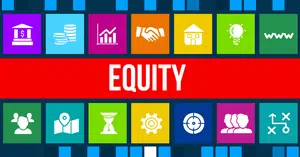Equity, Negative Equity and Making your Money Work For You
We discuss equity and negative equity, especially because it can be used to make your money work for you and has a significant impact in mortgage approval.
What is Equity?
In real estate, equity refers to the difference between the market value of a property and the outstanding mortgage balance. Therefore, it represents the portion of the property’s value that you truly own. As you make mortgage payments and property values appreciate, your value increases over time. You could see Equity as a form of savings that you can use, such as financing renovations or purchasing additional property.
How to increase equity
- Pay down the amount you owe by increasing your regular payments on your mortgage
- Pay down the mortgage through lump sum payments which reduces what you owe
- Have a larger deposit, which will lower the amount you need to borrow
- Make home improvements, which will increase property value.

Understanding Negative Equity
Negative equity is when the outstanding mortgage balance exceeds its current market value. It usually arises when property values decline or when homeowners borrow against their worth without sufficient appreciation in the property’s worth. Unfortunately, it limits homeowners’ financial flexibility and can lead to various complications, particularly if you need to sell the property.
With the drop in house prices – is this the end of the home ownership dream?
Dropping house prices are bad if you need or want to sell your house. New Dropping house prices are not good if you need or want to sell your house. New Zealanders’ budgets are under pressure. The cost of living has increased dramatically. Higher interest rates and declining house prices have made this worse.
House prices dropping is beneficial, as it makes housing more accessible, especially for young people. This is something that New Zealand desires.
A small or moderate fall in the value of your property should not be significant, depending on when you bought it. Your house value is likely still higher now than it was two years ago. The concern exists if you bought during the 2021 peak.
Staying current on payments eliminates the need to worry about negative equity. Therefore, there is no need to be overly concerned. If you need assistance with a mortgage, our brokers can help. They will guide you through the process and find the best solution for you.

The Impact of Equity on Mortgage Financing
Equity plays a significant role in the mortgage approval process in the New Zealand housing market. When you need financing, lenders consider several factors related to property value when evaluating loan applications
* Loan-to-Value-Ratio (LVR)
The loan-to-value ratio is the proportion of the property’s value that lenders are willing to finance. It is calculated by dividing the loan amount by the property’s appraised value. Lenders often set maximum LVR limits, typically ranging from 80% to 95%. Higher equity levels, resulting in a lower LVR, can increase the chances of mortgage approval.
* Deposit Requirements
When applying for a mortgage, lenders require borrowers to provide a deposit, which is generally a percentage of the property’s purchase price. The deposit acts as a safeguard for lenders, reducing their risk exposure. Higher equity levels means you can maker bigger deposits, which can lead to better mortgage terms, including lower interest rates and reduced fees.
* Borrowing Capacity
Equity can also influence your borrowing capacity. Lenders assess your ability to service the mortgage based on your income, expenses, and existing debt obligations. Having a higher level of equity can improve your borrowing capacity since it reduces the loan amount needed. Again, this results in a lower debt-to-equity ratio and potentially more favourable lending terms.
* Refinancing Opportunities
Equity can provide homeowners with opportunities to refinance their mortgages. Positive equity enhances your borrowing capacity, increases the likelihood of mortgage approval, and provides financial flexibility.
On the other hand, negative equity can restrict your options and pose challenges when you want financing.

Make Your Money Work For You With Equity
You have probably heard the quote from Robert Kiyosaki “Don’t work for the money, let the money work for you”. Here are some examples of how to put your money to work, by saving interest on loans with a higher interest rate, real estate investment or home improvements.
Home Improvement using equity
- One of the most common ways for Auckland homeowners to use their wealth is to pay for home improvement projects. Whether you want to fix up your kitchen, add an extra bedroom, or improve your outdoor space, you can get the money you need by using the equity in your home.
- Occasionally these loans have lower interest rates than other ways to borrow money, which makes them a good choice for paying for home upgrades. Also, the interest you pay on home equity loans may be tax-deductible in some cases, which can help you save even more money.
Using equity to pay down debt
- Investing in real estate can be a good way to make money, and a smart way to buy rental properties is to use the equity in your main home to pay for them. You can get a down payment or even buy an investment property outright with the wealth you’ve built up.
- The rental income can help you pay off the loan and maybe even build up more wealth. But it’s important to do a lot of study and talk to experts, like mortgage brokers and real estate agents, to make sure this strategy fits with your financial goals and how much risk you’re willing to take.
Applying equity to pay down debt
- Homeowners can use the equity in their home to pay off high-interest bills like credit card balances, personal loans, or car loans.
- You can pay off your other bills and simplify your monthly payments by or getting a home equity loan. This could save you money on interest payments and give you a clear plan for paying back the loan. But it’s important to be careful and make sure you won’t get into more debt after consolidating your current responsibilities.

Get Help to make the most of equity
Our mortgage advisor is knowledgeable and experienced. They can help you buy a home, refinance your current mortgage, and offer options to work with regarding equity. Working with them is the best way to achieve your goals.
They can guide you through the process and help you make informed decisions. Get in touch with us right away to talk about how you can use the wealth in your home to reach your financial goals.